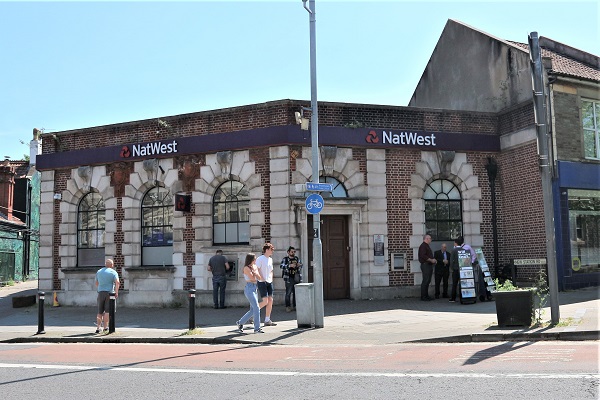BANKING giant NatWest is closing its Fishponds branch later this year.
The company, one of the ‘Big Four’ traditional UK high street banks, announced today that its branch in Fishponds Road will shut on September 4.
It is one of 55 closures announced by NatWest, just over a week after it returned to full private ownership when the government sold its final shares at the end of May.
It will leave Lloyds as the only major bank on Fishponds Road.
NatWest is recommending that customers who want to continue banking in person use its Kingswood branch, which is two miles away, or its Bristol city centre branch, more than three miles away.
The company said: “Banking has changed dramatically in recent years, with an increased demand for mobile and online services, as our customers benefit from a faster and easier way to bank.
“Closing a branch is a decision we take very seriously.
“We know it can affect those less confident with alternatives we offer.”
NatWest says the number of personal banking customers using the Fishponds branch has fallen by 53% in the past five years, and it is used by an average of 351 personal and 102 business customers each month.
It says 77% of personal banking customers with accounts at the Fishponds branch also use online banking or its mobile app.
It has sent a guide for customers affected by the closure, offering details of alternatives, including nearby post offices.
Barclays closed its Fishponds Road branch in 2020 and HSBC left in 2015.
Bailout cost taxpayer £10.5bn
In 2008-9, the government pumped £45.5 billion of taxpayers’ money into NatWest’s then parent group, RBS.
The government says the move saved RBS from collapse, protected its 40 million customers around the world and “prevented the UK economy and financial system from going over the edge”.
When it announced the sale of the government’s final shares on May 30, the Treasury said £35bn had been recovered through share sales, dividends and fees.
A Treasury spokesperson said: “While this is around £10.5 billion less than the original support, the alternative would have been a collapse with far greater economic costs and social consequences.
“The Office for Budget Responsibility are clear on this point: the cost of doing nothing would almost certainly have been far greater than the difference between the capital injected and proceeds returned.
“Allowing the bank to fail would have devastated people’s savings, mortgages and livelihoods — and shattered confidence in the UK’s financial system.”


